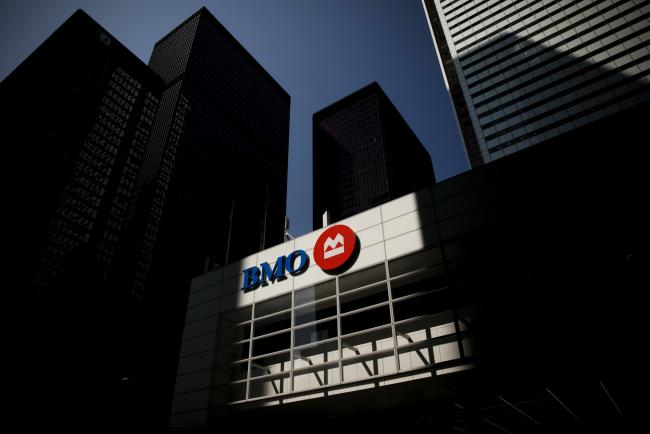(Bloomberg) -- Bank of Montreal's (TSX:BMO) drive to improve efficiencies has come with a cost: C$357 million, along with more job cuts.
The lender took the charge, which was C$484 million ($364 million) before taxes, mostly for severance payments as it eliminated 810 full-time positions, or 1.7% of its workforce, in the fiscal fourth quarter.
Chief Executive Officer Darryl White cited a “clear bank-wide focus on disciplined expense management” while announcing earnings that beat analysts’ expectations. The Toronto-based bank has “a number of initiatives under way, including today’s announcement of a restructuring charge, that will serve to accelerate our momentum and help us meet our efficiency objectives over the long-term,” he said in a statement Tuesday.
The latest restructuring charge -- which follows one taken in the second quarter of 2018, also tied to severances -- included a small amount of real-estate related costs and is part of White’s efforts to improve efficiencies at what has been Canada’s least-efficient bank. The company’s adjusted efficiency ratio -- a measure of what it costs to produce a dollar of revenue -- was 60% in the fourth quarter, down from 62.2% a year earlier, as the lender moves toward White’s target of 58% or better by the end of fiscal 2021.
“It is difficult for us to credit good expense control in the face of yet another restructuring charge from this bank, this time approaching C$500 million,” CIBC Capital Markets analyst Robert Sedran said in a note to clients. “However, the underlying segment performance was solid with improving volume growth, positive operating leverage and stable credit quality. A decent result.”
The job cuts were mostly in Canada and are the deepest since the last large round of reductions in May 2016, when it announced a 4% cut to its workforce, amounting to about 1,850 jobs. The bank had 45,513 employees as of the end of October, down from 46,323 at the end of July. The latest move comes about six months after the bank eliminated about 100 jobs across its capital-markets division.
Earnings Decline
The restructuring costs contributed to a 30% decline in net income in the quarter, with the bank posting earnings of C$1.19 billion, or C$1.78 a share. Adjusted per-share earnings were C$2.43, beating the C$2.41 average estimate of 14 analysts in a Bloomberg survey. The bank raised its quarterly dividend 2.9% to C$1.06 a share.
Wealth management led profit growth in the quarter, with a 22% increase in earnings from the year earlier, while Canadian and U.S. banking also gained. Earnings from the company’s BMO Capital Markets unit fell 9.7% amid a tougher year for dealmaking.
Also in the earnings announcement:

- Wealth management had its best quarter for profit growth since last year, with earnings of C$267 million, helping lift annual net income to C$1.06 billion. The bank aims to get C$2 billion in annual profit from wealth management by 2023.
- Earnings from Canadian personal-and-commercial banking, Bank of Montreal’s biggest business, rose 6.2% to C$716 million.
- In the U.S. banking division, which includes Chicago-based BMO Harris Bank, earnings climbed 5.6% to C$393 million in the quarter, even after the impact of Federal Reserve interest rate cuts. Net interest margins in the U.S. division narrowed to 3.35%, the lowest since at least 2010.
- Earnings from BMO Capital Markets fell 9.7% to C$269 million on a decline in revenue from investment banking fees and trading.